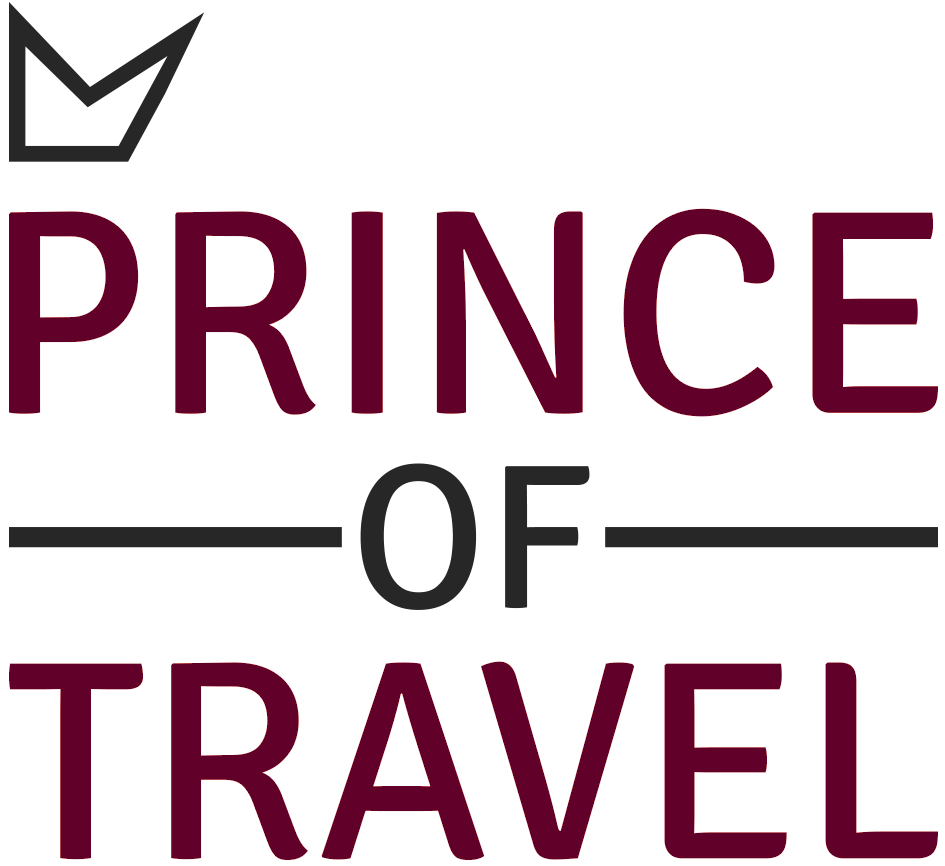Canadian Transportation Agency Proposes Fees for Airline Complaints

This week, the Canadian Transportation Agency (CTA) proposed a new $790 fee to charge airlines for each passenger complaint that the CTA is involved with to resolve, even if the CTA doesn’t rule in favour of the passenger.
These proposed fees are the latest development in the ongoing reform of Canada’s Air Passenger Protection Regulations (APPR), which have been a point of contention between passengers and airlines for nearly five years.
Canadian Transportation Agency Proposes Fee for Airline Complaints
In an effort to recoup some of the costs associated with resolving the huge number of complaints against airlines from passengers, the Canadian Transportation Agency has proposed charging airlines a $790 (CAD) fee for each compliant it must step in to resolve.
The CTA estimates that it can process 22,615 complaints per year, which comes with a total cost of $29,777,523 (CAD) or an average of $1,316 (CAD) per complaint.
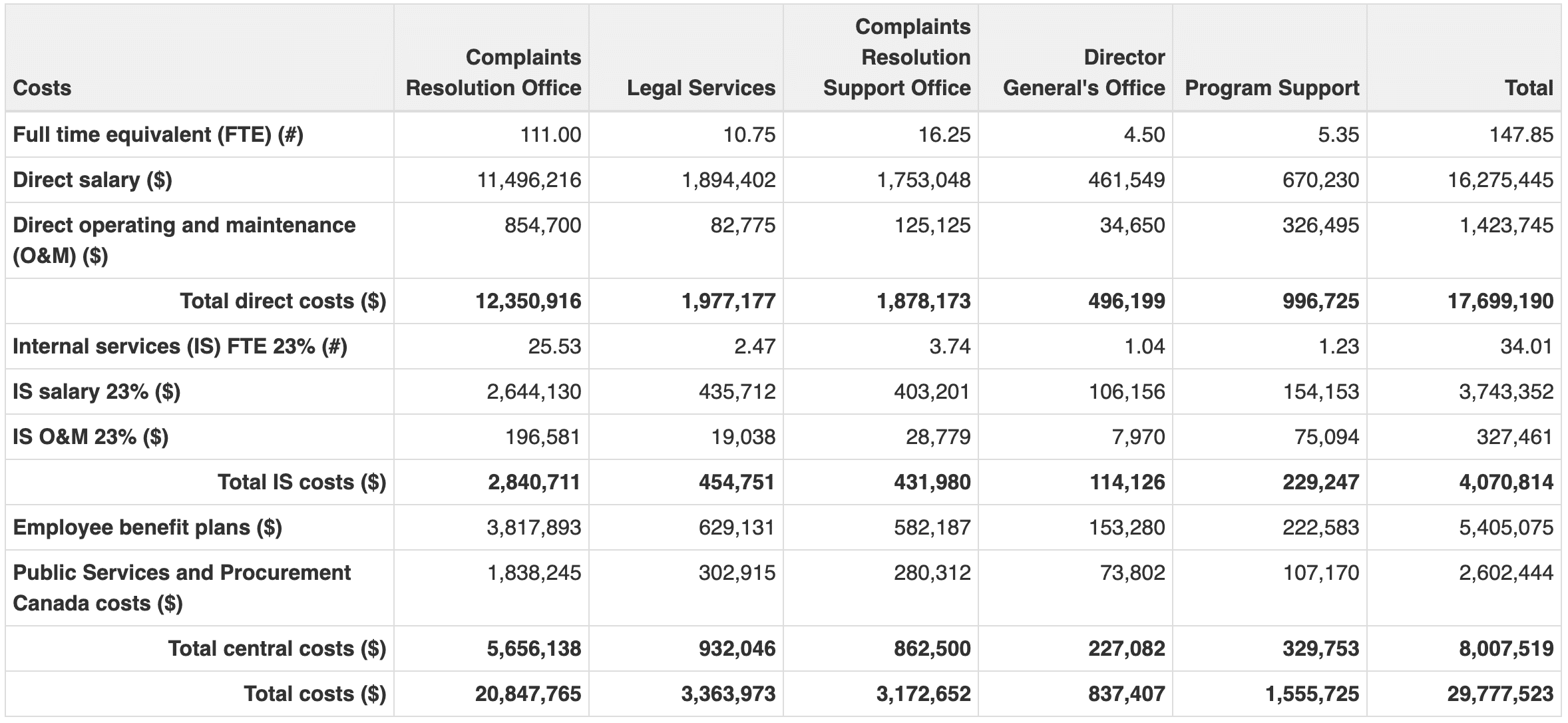
If its goal is to recover 60% of the total cost of resolving 22,615 complaints per year, it then needs to recoup $790 (CAD) per complaint, which the CTA will charge to airlines whether or not the CTA rules in the favour of the passenger.

As a reminder, airline passengers are eligible for compensation from airlines when flights are delayed or cancelled, but only in specific circumstances (e.g., if the flight was delayed due to reasons within the airline’s control but not required for safety).
Since the Air Passenger Protection Regulations were implemented in 2019, the CTA has faced a ballooning backlog of complaints from passengers who believe the airline didn’t adhere to refund, reimbursement, or compensation requests (and other complaints) as per the APPRs.
The backlog now sits at nearly 80,000 complaints – the highest it’s ever been – and the agency appears to be struggling to keep up with demand despite being allotted an extra $76 million over three years to help address the backlog and implementing a new process for resolving complaints.
In September 2023, the CTA adjusted the way it resolves complaints and now uses a six-step process:
- Passenger submits a complaint and it goes into a queue
- A complaint resolution Start Notice is issued (day 0)
- The airline responds to the complaint and the passenger replies
- Review for eligibility
- Informal resolution (optional)
- Final decision (completed by day 90)
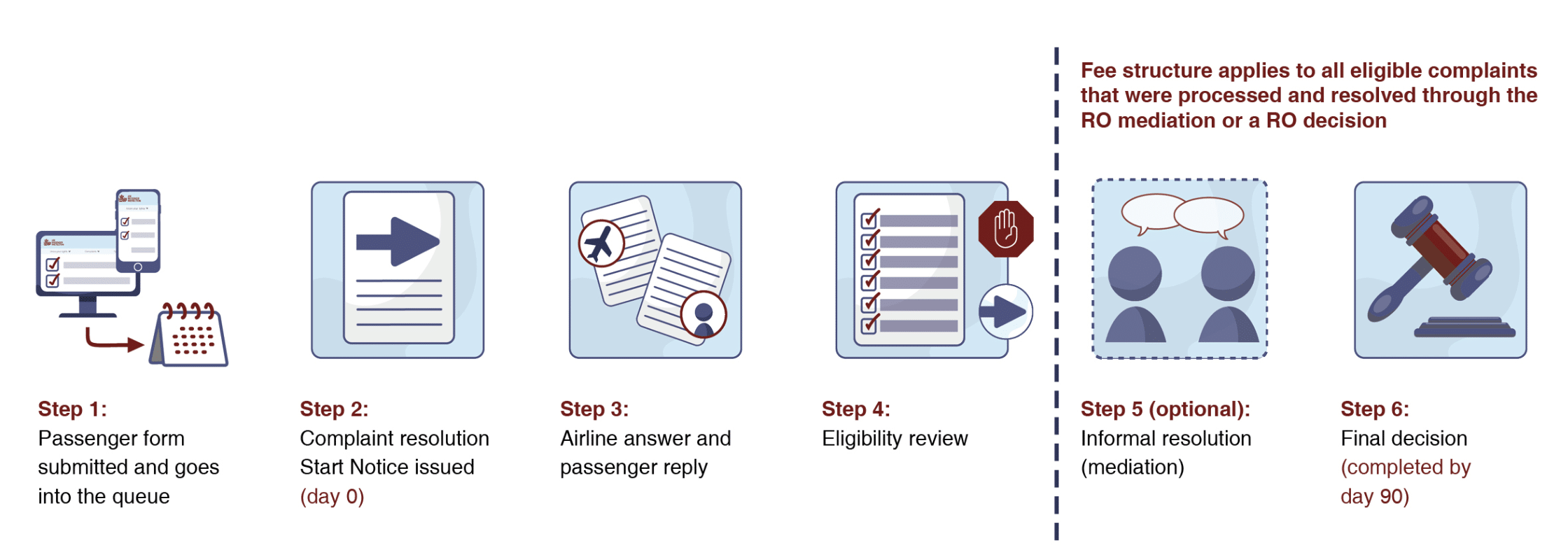
The proposed fees would apply to any complaints that make it to steps five or six, in which cases a Complaints Resolution Officer (RO) is assigned to intervene.
In other words, if the airline and passenger come to an agreement prior to the need for a Resolution Officer, the proposed $790 fee won’t be levied against the airline.
During the eligibility review phase, a Resolution Officer determines if the complaint meets criteria for mediation or a decision (e.g., the complaint has to be for compensation, a refund, or reimbursement of expenses, amongst other requirements).
As part of the process, the CTA has now opened a one-month consultation on the proposed fees and is asking for input prior to October 21, 2024.
Unsurprisingly, initial reaction from airlines (as reported in The Globe and Mail) was negative, calling it “a bad idea” and “concerning”.
Of course, the proposed fee isn’t yet set in stone, and airlines will be notified 30 days before the fee comes into force (if at all). If it does, the fee will apply to all eligible complaints with a start notice (Step 2 of the complaint resolution process) after the date on which the fee comes into effect.
The CTA Misses the Mark… Again
When the Canadian Air Passenger Protection Regulations (APPRs) were first implemented, they were smugly described as “a world-leading approach to air passenger rights that is clear, consistent, transparent and fair”.
If the ongoing backlog of complaints and spiralling costs that the CTA is dealing with are any indication, the APPRs (in their current form) are anything but clear, consistent, transparent, or fair.
Perhaps the most impactful course of action here would be for the CTA to implement changes that would reduce the need for passengers to complain in the first place.
As they’re currently written, there’s a lot of room for interpretation in the APPRs, especially when it comes to what officially counts as a situation within the carrier’s control but required for safety and what doesn’t.
As it stands, it’s also very difficult for passengers to determine the exact cause for a flight delay or cancellation. To be fair, there are often multiple reasons for delays, but it’s still not transparent at all, to the point that passengers on the same flight sometimes receive multiple different reasons for the cause of a delay or cancellation.
The CTA also publishes results from decisions; however, the only information available to the public is general in nature, and doesn’t offer any insight into the exact reason why a complaint was dismissed or accepted. These are precisely the details that would make it abundantly clear what does and does not count when it comes to reasons for compensation, refunds, and reimbursements, which should be fair to both passengers and airlines.
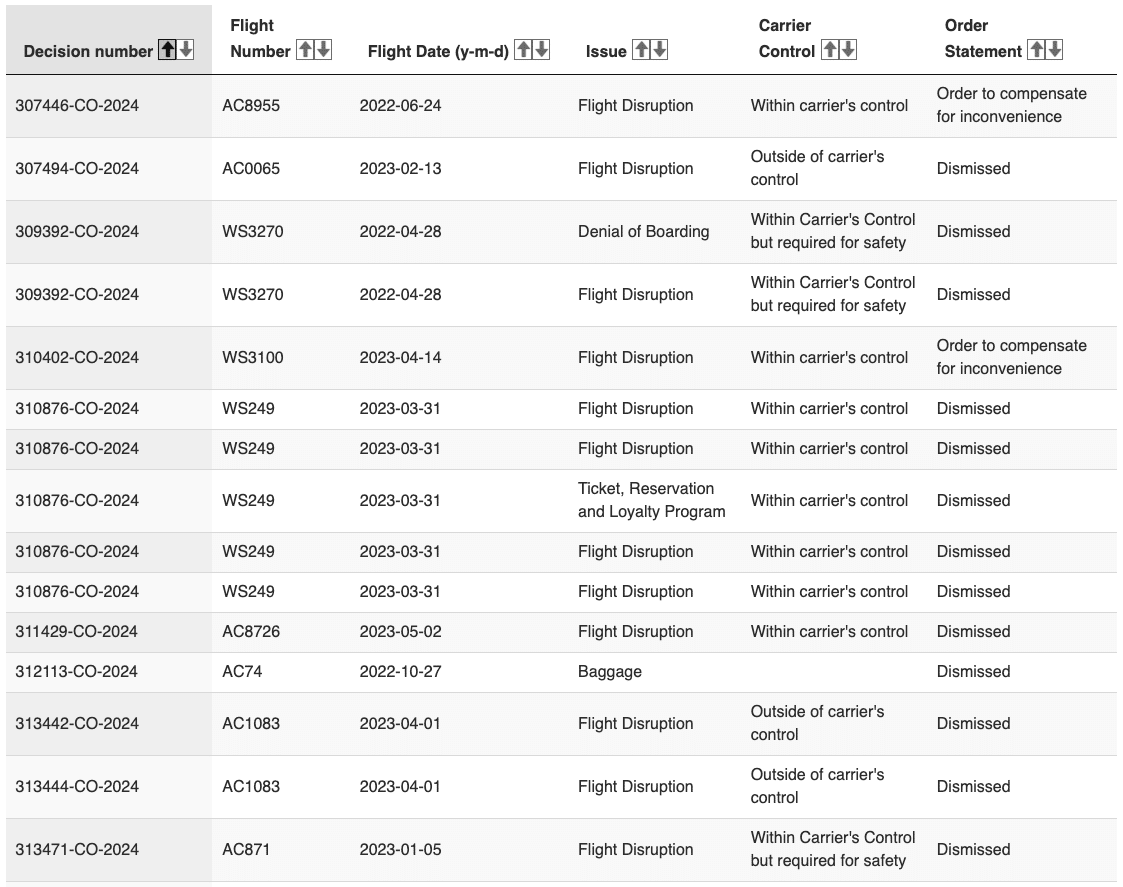
Of the roughly 9,500 decisions posted on its website, the CTA dismissed roughly half of the complaints, including for situations within the carrier’s control, within the carrier’s control but required for safety, and outside the carrier’s control.
However, if the information surrounding reasons for delays and cancellations was clear and readily available, then there shouldn’t be a need for passengers to file a complaint in the first case, since they’d know when compensation/refunding/reimbursements are due and when they aren’t.
Ideally, this would also reduce the need for passengers to take matters into their own hands and take airlines to small claims court for a more timely decision, rather than waiting for their turn in the CTA’s backlog.
Lastly, a quick search through the list of enforcement actions taken by the CTA against airlines so far in 2024 shows a relatively minor amount of fines levied against airlines for failing to adhere to valid compensation requests as per the APPRs.
In some cases, it works out to be about $200 or so per incident, which is hardly enough to warrant serious change from airlines, while in others, it’s a bit steeper ($800), which likely gets a bit more attention.

Notably, the CTA has issued much steeper fines against airlines for contravening the Accessible Transportation for Persons with Disabilities Regulations, and airlines are making meaningful changes (rightfully so).

If the CTA were to ramp up enforcement of the APPRs such that the penalties given to airlines were significant enough to warrant change, more complaints would likely be resolved long before there’s a need for anyone from the CTA to step in.
It’s worth noting that there are proposed changes to the APPRs; however, it’s not clear when they’ll be implemented, and exactly what the changes will be.
Conclusion
The Canadian Transportation Agency is proposing levying a fee against airlines whenever a Resolution Officer must step in to resolve a passenger complaint. The proposed fee is $790 (CAD) per complaint, which would recuperate roughly 60% of the cost of dealing with a complaint.
As it stands, the CTA is dealing with a growing backlog of nearly 80,000 complaints, and changes to the Air Passenger Protection Regulations are being considered.
If you’d like to weigh in on the proposed fee, the CTA is accepting feedback until October 21, 2024.

T.J. is curious about everywhere he hasn’t been to yet. Exploring countries by foot and connecting with locals guide his love for travel. Earning and redeeming points to jazz up the experience has become the icing on his travel cake.
First-year value
$336
Monthly fee: $15.99
• Earn 1,250 points per month upon spending $750 per month for 12 months
Earning rates
Key perks
- Transfer to airline and hotel partners
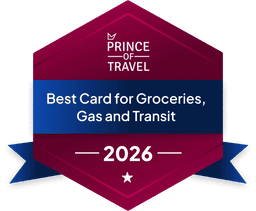
Monthly fee: $15.99
• Earn 1,250 points per month upon spending $750 per month for 12 months
Earning rates
Key perks
- Transfer to airline and hotel partners
